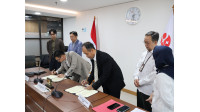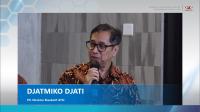Indonesia will need to decouple carbon emissions
03:15:00 | 17 Jul 2023

JAKARTA (IndoTelko) AC Ventures (ACV) and Boston Consulting Group (BCG) jointly released Indonesia premier report on the decarbonization sector and its sweeping implications for the nation’s "green growth" potential, outlining a pivotal role for the country on the global stage as it seeks to transform its economy.
"Green growth" is a term to describe a path of economic growth and prosperity that is also environmentally sustainable.
Titled "Catalyzing Indonesia’s Green Growth Potential," the report launched during an online press conference, in which BCG Project Leader Brendan Board presented an overview of the report’s key findings, followed by a panel discussion with BCG’s Managing Director and Partner in Singapore Marc Schmidt, AC Ventures’ Principal of ESG Lauren Blasco, and Maka Motors’ Co-founder and CEO Raditya Wibowo. The panel then conducted a live Q&A session with reporters from around Southeast Asia.
As the fourth largest global greenhouse gas (GHG) emitter, Indonesia faces significant environmental challenges and stands critically exposed to climate change risks.
Lauren Blasco of AC Ventures explained, "However, Indonesia also possesses the immense potential to transition to a green economy. This shift is an opportunity for startups, MSMEs, and investors to play a leading role in fostering sustainable economic development and combating climate change."
According to the report, green growth in Indonesia involves three key focus areas strategy and professional services (a US$46 billion potential market by 2030), solutions that optimize GHG intensity (a US$350 billion potential market by 2030), and emission offsetting (a US$3.5 billion potential market by 2030).
To leverage these opportunities fully, the report lays out how Indonesia can boost green financing, develop supportive regulatory frameworks, and nurture green talent. These measures will be crucial in meeting Indonesia"s ambitious emission-reduction targets for 2030 and supporting the country"s continued economic growth.
Marc Schmidt of BCG said, "Building a low-carbon economy and the associated decarbonization will provide opportunities for stakeholders across all sectors, including Indonesia’s large and important MSME sector. Broad participation by innovators will be essential to implement and sustain the necessary changes in Indonesia"s economy."
Lauren said, "Our report underlines the tremendous decarbonization potential Indonesia holds. For example, the international demand for voluntary carbon credits is set to skyrocket, increasing by about 27% annually until 2030. Currently, around 30% of the world’s total carbon reserves are in Indonesia’s peatlands alone. When we commoditize their preservation, Indonesia is poised to be a frontrunner in this burgeoning market. We foresee our carbon credit market expanding to 140 million tons by 2030, a huge leap from the 40 million issued in the past decade. At a projected rate of US$25 per ton, this market alone could bring in US$3.5 billion annually, signaling a significant opportunity."
Indonesia, as Southeast Asia"s single largest economy and one that is projected to be the world"s fourth-largest by 2050, has a considerable stake in transforming into a green growth economy. Not only is this transformation environmentally imperative, but it is also a substantial business opportunity. The report estimates the value of Indonesia"s green growth opportunity at US$400 billion, combining industry revenue and carbon offset potential.
The report also spotlights the potential for smaller-scale ventures like startups and MSMEs, as well as investors and financiers, to drive Indonesia"s transition. For instance, Unravel Carbon, a notable startup providing a SaaS decarbonization platform, and MAKA Motors, accelerating EV two-wheeler adoption in Indonesia, exemplify the country"s emerging green growth sector. Meanwhile, ventures like Fairatmos aid carbon mitigation project developers, establishing a developing domestic carbon credit ecosystem.
To address the nation’s significant talent shortage, especially in the green startup space, Indonesia has established the National Talent Management body to develop and retain talent. Simultaneously, the Indonesian Financial Services Authority (OJK) is fostering sustainable finance practices, and the country"s central bank has joined the Network for Greening the Financial System (NGFS).
"Indonesia"s path to green growth is clear, but the journey will require concerted efforts from all sectors," said Marc. "We"re calling on businesses, citizens, financiers, and investors to join us in building a future that"s sustainable and equitable for all."
Lauren added, "In developing the regulatory frameworks and driving green growth across the economy, it"s crucial to ensure a "just transition.’ We need to consider the interests of all stakeholders and create economic transformations that are fair and equitable."(es)
Baca juga :
•
•
•
Artikel Terkait
-
 English Ver. - 05:36:00 | 11 Feb 2026ITSEC Asia successfully developed and commercialised the IntelliBroń Platform
English Ver. - 05:36:00 | 11 Feb 2026ITSEC Asia successfully developed and commercialised the IntelliBroń Platform -
 English Ver. - 04:06:00 | 25 Aug 2025The collaboration is designed to simplify complex payment processes for global travel businesses
English Ver. - 04:06:00 | 25 Aug 2025The collaboration is designed to simplify complex payment processes for global travel businesses -
 English Ver. - 04:07:00 | 11 Aug 2025Wireless Logic has completed the acquisition of Zipit Wireless
English Ver. - 04:07:00 | 11 Aug 2025Wireless Logic has completed the acquisition of Zipit Wireless
Rekomendasi
Berita Pilihan
More Stories
PR Newswire





























































